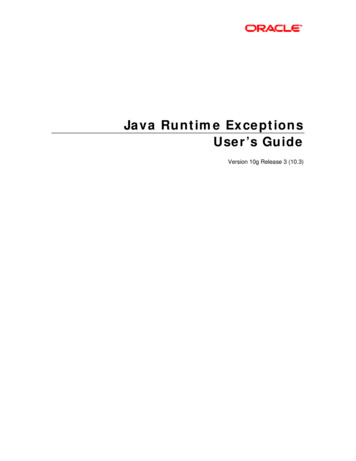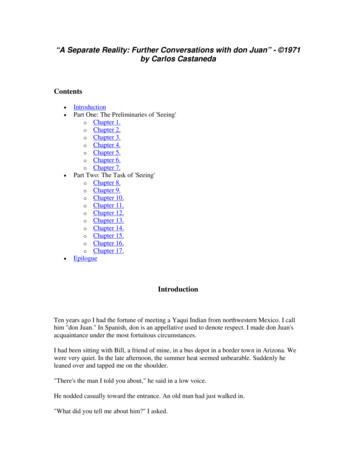
Transcription
Chapter 3:Exceptions to DisclosureThe general right of access to records granted by the PIA is limited by numerousexceptions to the disclosure requirement. Given the PIA’s policy in favor of publicaccess and the requirement that the PIA generally “be construed in favor of permittinginspection of a record,” these exceptions should be construed narrowly, unless an“unwarranted invasion” of personal privacy would result. GP § 4-103(b). See alsoGlenn v. Maryland Dep’t of Health & Mental Hygiene, 446 Md. 378, 386-87 (2016)(explaining that although the exceptions “rebut the presumption in favor of disclosure,”they should generally be construed narrowly); Police Patrol Sec. Sys., Inc. v. PrinceGeorge’s County, 378 Md. 702, 717 (2003) (although there is no “general catchall”exemption for personal privacy, the language of what is now GP § 4-103(b) directs that“the [PIA] be construed more narrowly, and its exemptions more broadly, whenprivacy issues are at stake”); Office of the Governor v. Washington Post Co., 360 Md.520, 544-45 (2000).The PIA exceptions fall into three basic categories. First, the exceptions inSubtitle 3, Part I generally require a custodian to deny inspection if a source of lawoutside the PIA prevents disclosure. GP § 4-301. Second, the mandatory exceptions inParts II and III require the custodian to deny inspection for specific classes of recordsand information. Third, the exceptions in Part IV permit the custodian to exercisediscretion as to whether the specified records are to be disclosed. More than oneexception may apply to a public record, and the exceptions are not mutually exclusive.Office of the Attorney General v. Gallagher, 359 Md. 341, 353-54 (2000). Many of theexceptions are an attempt by the Legislature to balance individual privacy interestsagainst the public right of access. University System of Maryland v. Baltimore Sun Co.,381 Md. 79, 95 (2004).In addition, Part V of the PIA contains a “last resort” provision, which allows acustodian to deny inspection temporarily and seek court approval to continue towithhold a record that otherwise would be subject to inspection. GP § 4-358. Unlessan agency obtains a special court order under the statute to justify withholding a record,there is no basis for withholding a record other than an exception in the PIA. See, e.g.,
Maryland Public Information Act Manual (17th ed., July 2022)3-2Police Patrol Sec. Sys., 378 Md. at 716-17 (there is no discrete “public interest,”“personal information,” or “unwarranted invasion of privacy” exemption to PIA).Many of the PIA’s exceptions parallel those in FOIA. Cases decided undersimilar provisions of the federal FOIA are persuasive precedents in construing the PIA.See, e.g., Glass, 453 Md. 201, 208 (2017); Equitable Tr. Co. v. State Comm’n on HumanRelations, 42 Md. App. 53, 75-76 (1979), rev’d on other grounds, 287 Md. 80 (1980); 58Opinions of the Attorney General 53, 58-59 (1973).A.Exceptions Based on Other Sources of LawUnder GP § 4-301(a)(1), inspection is to be denied where “by law, the publicrecord is privileged or confidential.” Furthermore, under GP § 4-301(a)(2), thecustodian must deny inspection if the inspection is contrary to: State statute, GP § 4-301(a)(2)(i); federal statute or regulation, GP § 4-301(a)(2)(ii); or a rule adopted by the Court of Appeals or order of a court of record, GP§ 4-301(a)(2)(iii), (iv).1.State StatutesMany State statutes bar disclosure of specified records. Some representativeexamples of these statutes include, among others: Section 10-219 of the Criminal Procedure Article restricts disseminationof “criminal history record information.” 92 Opinions of the AttorneyGeneral 26, 30-37 (2007); Section 3-8A-27 of the Courts & Judicial Proceedings Article protectscertain police and court records pertaining to minors. See 85 Opinions ofthe Attorney General 249 (2000) (protection under statute only applies torecords concerning matter that could bring minor within jurisdiction ofthe juvenile court); Section 3-602 of the Correctional Services Article protects inmates’ caserecords. See 86 Opinions of the Attorney General 226 (2001) (protectiondoes not extend to projected release date for mandatory supervision);
Maryland Public Information Act Manual (17th ed., July 2022)3-3 Section 16-118(d) of the Transportation Article provides that records ofthe Medical Advisory Board are generally confidential. See 82 Opinionsof the Attorney General 111 (1997) (person in interest is entitled to MVAinformation relating to the person’s fitness to drive, subject to limitedexceptions); Tax information is protected under § 13-202 of the Tax-General Articleand § 1-301 of the Tax-Property Article. See MacPhail v. Comptroller,178 Md. App. 115, 120-22 (2008); Letter of Assistant Attorney GeneralKathryn M. Rowe to Ms. Ann Marie Maloney (Dec. 15, 2004); and Disclosure of “medical records” is restricted by the MarylandConfidentiality of Medical Records Act, §§ 4-301 through 4-309 of theHealth-General Article. See 90 Opinions of the Attorney General 45, 4852 (2005).Under GP § 4-301(a)(2)(i), statutes of this kind bar disclosure despite theotherwise broad right of access given by the PIA. See, e.g., Waterkeeper Alliance, Inc.v. Maryland Dep’t of Agric., 439 Md. 262, 268 (2014) (with regard to nutrientmanagement plans, citing § 8-801.1(b)(2) of the Agriculture Article as “the operativeexcepting statute”); 81 Opinions of the Attorney General 164, 165-67 (1996) (applyingstatutory accountant-client privilege).2.Federal StatutesSimilarly, a federal statute or regulation may prevent disclosure of a record. Forexample, the Family Educational Rights and Privacy Act of 1974 (FERPA) restrictsaccess to student records. See 20 U.S.C. § 1232g(a) and (b); 34 C.F.R. § 99.3; 92 Opinionsof the Attorney General 137, 143-45 (2007); Letter of Assistant Attorney GeneralRobert N. McDonald to Delegate William A. Bronrott (March 3, 2010) (FERPAregulations permit disclosure of University determination that a student committed acrime of violence or non-forcible sex offense). Also, states must limit disclosure ofinformation concerning food stamp applicants. 7 U.S.C. § 2020(e)(8). Certain criticalinfrastructure information and homeland security information that the federalgovernment shares with the State or local governments may not be disclosed under thePIA. See 6 U.S.C. §§ 673(a)(1)(E) and 482(e), respectively.
Maryland Public Information Act Manual (17th ed., July 2022)3-4These exceptions are basically statements of the federal preemption doctrine.See 94 Opinions of the Attorney General 44, 46-64 (2009); 88 Opinions of the AttorneyGeneral 205 (2003) (addressing confidentiality of medical records under HIPAA andState law). In some instances, a federal prohibition against disclosure that is a conditionof federal funding is effective only if the State has “accepted” that condition. SeeChicago Tribune Co. v. University of Illinois Board of Trustees, 781 F. Supp. 2d 672,675-76 (N.D. Ill. 2011).3.Court RulesA rule adopted by the Court of Appeals or order of a court of record can alsoprevent disclosure of a record. A court rule fitting this description is Maryland Rule 4642, which requires court records pertaining to certain criminal investigations to besealed and protects against disclosure of matters occurring before a grand jury. Officeof the State Prosecutor v. Judicial Watch, Inc., 356 Md. 118, 131-34 (1999) (discussingRule 4-642). Similarly, the Maryland Rules require that a search warrant be issued“with all practicable secrecy” and set restrictions on the subsequent dissemination ofcopies of search warrants. See Md. Rules 4-601 and 4-263. A public official oremployee who improperly discloses search warrant information prematurely may beprosecuted for contempt. Rule 4-601; 87 Opinions of the Attorney General 76 (2002)(absent court order, State’s Attorney’s Office may not make available to a communityassociation the address and date of execution of a search warrant relating to drugviolations for community association’s use in bringing a drug nuisance abatementaction if information has not otherwise been made public). Another example of a courtorder that would fall within this exception is an order to seal records in a divorce orcustody case.A rule that permits limited disclosure does not necessarily open a record to thegeneral public. For example, Rule 19-707(f)(3) permits Bar Counsel to disclose to acomplainant, on request, the status of an investigation and any disciplinary or remedialproceedings resulting from information from the complainant. In interpreting apredecessor to the current rule, the Court of Appeals held that, although it allowslimited disclosure to the complainant, it does not make the information subject togeneral disclosure under the PIA. Attorney Grievance Commission v. A.S. Abell Co.,294 Md. 680, 686-89 (1982).
Maryland Public Information Act Manual (17th ed., July 2022)3-5As explained further in Chapter 10, the Court of Appeals, pursuant to its powerunder Article IV, § 18(a) of the Maryland Constitution to adopt rules concerning thepractice and procedure in and the administration of the courts of the State, has alsoadopted rules governing access to various categories of judicial records. Md. Rule 16901 through 16-934. Although these rules sometimes track the exemptions that are inthe PIA (or make those PIA exemptions applicable to certain judicial records), the rulesare what governs access to judicial records, see Md. Rules 16-901(a) and 16-902(b), andthe PIA, by its terms, defers to that “other law” governing confidentiality. See, e.g., GP§§ 4-301, 4-304, 4-328, 4-343.4.PrivilegesThe “privileged or confidential by law” exception under GP § 4-301(a)(1) refersto traditional privileges like the attorney-client privilege and the doctrine of grand jurysecrecy. While records subject to the attorney-client privilege must be protected underGP § 4-301(a)(1), the privilege may be waived by the party entitled to assert it. Caffreyv. Department of Liquor Control for Montgomery County, 370 Md. 272, 304 (2002)(Montgomery County Charter provision effectuated limited waiver of attorney-clientprivilege); see also 64 Opinions of the Attorney General 236, 239-40 (1979) (applyingcommon law doctrine of grand jury secrecy). In addition, in Harris v. Baltimore SunCo., 330 Md. 595, 604-05 (1993), the Court of Appeals concluded that the MarylandRule of Professional Conduct that governs client confidentiality for lawyers cansometimes provide a separate legal basis for protecting material of this kind, even if thematerial would not be protected by the attorney-client privilege. See also Md. Rule 19301.6 (generally prohibiting an attorney from revealing information about therepresentation of a client without client consent). Under that decision, a custodianwho is an attorney may not disclose a public record consisting of confidential clientinformation if disclosure would put the attorney in violation of what is now Rule 19301.6. See Harris, 330 Md. at 602-05.Another example of information protected by a recognized privilege isconfidential executive communications of an advisory or deliberative nature. SeeStromberg Metal Works, Inc. v. University of Maryland, 382 Md. 151, 161-63 (2004);Office of the Governor v. Washington Post Co., 360 Md. 520, 557-65 (2000); Hamiltonv. Verdow, 287 Md. 544, 553-67 (1980); Laws v. Thompson, 78 Md. App. 665, 690-93(1989); 66 Opinions of the Attorney General 98, 100-01 (1981). The Court of Appeals
Maryland Public Information Act Manual (17th ed., July 2022)3-6has stated that the executive privilege encompassed within GP § 4-301(a)(1) shieldsrecords made in connection with the deliberative decision-making process used by highexecutive officials such as the Governor and the Governor’s immediate advisors—although the actual custodian of the records may be someone other than the officialholding the privilege. Stromberg Metal Works, Inc., 382 Md. at 161-63. The executiveprivilege encompassed within GP § 4-301(a)(1) is not limited to the executive branchof government; it extends to the Chief Judge of the Court of Appeals and presidingofficers of the General Assembly as well. Hamilton, 287 Md. at 553-54 n.3. Recordsthat reveal the deliberative process of other government officials may be protectedunder a broader common law deliberative process privilege that is encompassed by thediscretionary inter- and intra-agency exemption in GP § 4-344. Stromberg MetalWorks, Inc., 382 Md. at 163-67; see Part D.1 of this Chapter below.To be clear, not every executive communication is itself advisory or deliberative.In Office of the Governor, the Court of Appeals rejected a blanket claim of executiveprivilege for telephone and scheduling records sought by the newspaper. Because thesedocuments were not of an advisory or deliberative nature, the Governor was notentitled to a presumptive privilege. However, the Court instructed the trial court onremand to consider whether individual records were privileged because the disclosureof particular phone numbers or scheduling records in “identified special circumstances”would interfere with the deliberative process of the Governor’s office. The Court alsorecognized that the passage of time might mitigate any harmful effect disclosure couldhave on the current deliberations of the executive. 360 Md. at 561-65.The Speech and Debate Privilege—or “legislative privilege”—provided to Statelegislators by the Maryland Constitution may also prohibit disclosure of certain recordsof legislators and legislative agencies. See Maryland Constitution, Art. III, § 18(providing immunity from civil and criminal liability for “words spoken in debate”);Declaration of Rights, Art. 10 (prohibiting the judiciary from “impeach[ing]” the“freedom of speech and debate”); Letter from Assistant Attorney General Richard E.Israel to William Ratchford (June 29, 1993); see also Blondes v. State, 16 Md. App. 165,176-77 (1972). These constitutional provisions not only protect legislators from theconsequences of litigation but also from the attendant burdens and, therefore, functionas a recognized evidentiary and testimonial privilege. See, e.g., Montgomery Countyv. Schooley, 97 Md. App. 107, 118 (1993). The protections of the legislative privilegecan also extend to legislative staff when the activities, if performed by legislators, would
Maryland Public Information Act Manual (17th ed., July 2022)3-7be privileged. Marylanders for Fair Representation v. Schaefer, 144 F.R.D. 292, 298 (D.Md. 1992).The scope of the legislative privilege is broad; it applies generally “to acts whichoccur in the regular course of the legislative process and into the motivation for thoseacts.” Blondes, 16 Md. App. at 177; see also id. at 178 (explaining that the privilegeextends to acts that are “an integral part of the deliberative and communicative processby which Members participate in committee and House proceedings” (quoting Gravelv. United States, 408 U.S. 606, 625 (1972)). It is not, however, unlimited. For example,the privilege was found not to apply to shield a legislator from prosecution for bribery,as it does not “prohibit inquiry into activities which are causally or incidentally relatedto legislative affairs but not a part of the legislative process itself.” Id. at 177-79. Theprivilege also likely does not apply, at least as a general matter, to documents involvingroutine constituent service, which is not “ordinarily an integral part of the legislativeprocess.” Letter from Deputy Attorney General Ralph S. Tyler to Hon. Leo Green (July22, 1991).Although the constitutional protections applicable to State legislators do notextend to members of county or municipal governing bodies, those officials—whenacting in a legislative capacity—do possess a common law privilege that is consideredco-extensive in scope. Floyd v. Baltimore City Council, 241 Md. App. 199, 211 (2019);Schooley, 97 Md. App. at 114-15; see Letter of Assistant Attorney General Richard E.Israel to Senator David R. Craig (March 4, 1998); see also Part D1 of this Chapter,addressing inter- and intra-agency memoranda, below, and Purtilo v. Dwyer, Case No.269262-v (Circuit Court for Montgomery County, April 24, 2006) (discussing PIAaction against State legislators).5.Local Ordinances and Agency RegulationsAn ordinance enacted by a local government does not constitute other “law” forpurposes of § 4-301(a)(1) and cannot by itself supply a basis for withholding a publicrecord otherwise available under the PIA. Lamson v. Montgomery County, 460 Md.349, 364 (2018); Police Patrol Security Systems v. Prince George’s County, 378 Md. 702,710, 713-15 (2003); see also 86 Opinions of the Attorney General 94, 106-07 (2001)(municipal ordinance, if construed as a blanket prohibition on disclosure of certainrecords, would thwart the purpose of the PIA). However, a confidentiality provision
Maryland Public Information Act Manual (17th ed., July 2022)3-8in a local ordinance that is derived from a State statute can be a basis for denying accessto records. See 92 Opinions of the Attorney General 12, 15-16 (2007) (confidentialityprovision in local ethics ordinance based on model ordinance under the Public EthicsLaw).Conversely, local law may not authorize release of a public record if disclosureis expressly prohibited by the PIA. Police Patrol Sec. Sys., 378 Md. at 712; see alsoCaffrey v. Dep’t of Liquor Control for Montgomery County, 370 Md. 272, 303 (2002).An exception would be where a local law required disclosure in a manner authorizedby a State statute other than the PIA. See, e.g., 71 Opinions of the Attorney General282 (1986) (financial disclosures pursuant to county ethics ordinance). However, locallaw might affect access to public records that are subject to discretionary exemptionsunder Part IV. Thus, “home rule counties may direct or guide the exercise of thisdiscretion, or even eliminate it entirely, by local enactment.” Police Patrol Sec. Sys.,378 Md. at 712; see also Caffey, 370 Md. at 305 (permissible denials of PIA subject towaiver by county). The same rule would apply to enactments of municipalcorporations. 86 Opinions of the Attorney General 94, 107 (2001) (suggesting that amunicipal ordinance could direct a custodian’s exercise of discretion permitted by thePIA).Nor may an agency regulation provide an independent basis for withholding apublic record (except for the special case of “sociological data,” discussed in Part C.1 ofthis Chapter, below). A contrary interpretation would allow State agencies at theirelection to undermine the Act. Cf. Public Citizen Health Research Group v. FDA, 704F.2d 1280, 1287 (D.C. Cir. 1983) (for this reason, the court gave little weight to an FDAregulation broadly interpreting the “trade secret” exemption). Additionally, had theGeneral Assembly intended to give this effect to a State regulation, it would have beenincluded in the list in GP § 4-301, which does mention federal regulations.B.Required Denials Specific RecordsUnder Subtitle 3, Part II the custodian must deny the inspection of certainspecified records. However, any of these records may be available for inspection if“otherwise provided by law.” GP § 4-304. Thus, if another source of law allows access,then an exception in Part II does not control. See Immanuel v. Comptroller ofMaryland, 449 Md. 76, 95 (2016) (financial information that would otherwise be
Maryland Public Information Act Manual (17th ed., July 2022)3-9exempt from disclosure under the PIA must be provided when the AbandonedProperty Act independently requires disclosure); 79 Opinions of the Attorney General366 (1994) (although personnel records and other information regarding employees inBaltimore City School System would otherwise be nondisclosable, disclosure wasauthorized by virtue of a federal district court order). Subpoenas might also serve as“other law” capable of overriding a specific exemption under the Act, although theCourt has never addressed the issue or explored the extent to which different types ofsubpoenas might have different compulsive effect. See Fields v. State, 432 Md. 650,677-79 (2013) (McDonald, J. concurring); see also pp. 3-53 to 3-55 below (discussinginterplay between civil discovery and the PIA).The converse is also true: Part II may allow access to records, but “other law”may deny access. For example, names, addresses, and phone numbers of students maybe disclosed to an organization such as a PTA under GP § 4-313(c)(1)(i). However, theFamily Educational Rights and Privacy Act of 1974, 20 U.S.C. § 1232g (also known asthe “Buckley Amendment,” or by its acronym FERPA), is “other law” that supersedesthe PIA. Under this federal statute, a student or parent may refuse to allow thestudent’s name and address to be released by refusing to allow it to be classified asdirectory information. If they do not refuse, the name and address are considereddirectory information and may be released. As to the types of records protected underthe Buckley Amendment, see Kirwan v. Diamondback, 352 Md. 74, 89-94 (1998)(federal statute governing “education records” does not cover records of parking ticketsor correspondence between the NCAA and the University of Maryland, College ParkCampus); cf. Zaal v. State, 326 Md. 54, 72-76 (1992) (FERPA and Maryland regulationsconcerning the disclosure of student records do not exclude a student’s educationrecords from discovery in litigation).The following categories of records are listed in Subtitle 3, Part II:1.Adoption and Welfare RecordsUnder GP §§ 4-305 and 4-307, adoption records and welfare records,respectively, on an individual person are protected. See 71 Opinions of the AttorneyGeneral 368 (1986) (discussing limited conditions under which information about thehandling of a child abuse case by a local department of social services may be disclosed);see also 89 Opinions of the Attorney General 31, 43 & n.7 (2004); Md. Code Ann.,
Maryland Public Information Act Manual (17th ed., July 2022)3-10Family Law § 5-357(a) (permitting access to information in the adoption record—otherthan certain identifying information—to an adoptee or the adoptive or former parentof an adoptee).2.Library Circulation RecordsUnder GP § 4-308, public library circulation records that identify the transactionof a borrower are protected. See Letter from Assistant Attorney General Richard E.Israel to Delegate John J. Bishop (Feb. 28, 1990) (FBI agents may not inspect libraryrecords unless acting pursuant to a lawfully issued search warrant or subpoena).However, another statute may provide authority for a search absent a warrant orsubpoena. See 50 U.S.C. § 1862 (authority of FBI to obtain order under USA PatriotAct for production of records in connection with certain foreign intelligence andinternal terrorism investigations).3.Letters of ReferenceUnder GP § 4-310, letters of reference are protected. This exemption applies toall letters, solicited or unsolicited, that concern a person’s fitness for public office oremployment. 68 Opinions of the Attorney General 335 (1983). The exemption mayalso extend to letters of reference submitted to the government in connection withapplications for professional licenses, although the Maryland courts have not yetaddressed that question. See Letter from Assistant Attorney General Patrick B. Hughesto Insurance Commissioner Al Redmer (June 19, 2019). The Court of Appeals has alsoleft open the question whether a record, memorandum, or notes reflecting a telephoneconversation or meeting to obtain information about a prospective appointee mightcome under the exception. However, a record simply indicating that a telephoneconversation or meeting occurred about a prospective appointee is “certainly not a‘letter of reference.’” Office of the Governor v. Washington Post Co., 360 Md. 520, 547(2000).4.Personnel RecordsUnder GP § 4-311, “personnel records” of an individual are protected; however,such records are available to the person who is the subject of the record and to theofficials who supervise that person. Additionally, the parts of a personnel record thatcontain the individual’s home address, home telephone number, and cell phone
Maryland Public Information Act Manual (17th ed., July 2022)3-11number are available to certain employee organizations. GP § 4-311(b)(3). An agencymay not generally share personnel records with other agencies; however, it is implicitin the personnel records exemption that another agency charged with responsibilitiesrelated to personnel administration may have access to those records to the extentnecessary to carry out its duties. 86 Opinions of the Attorney General 94, 108-09(2001).The PIA does not define “personnel records,” but it does indicate the type ofdocuments that are covered: applications, performance ratings, and scholasticachievement information. “Although this list was probably not intended to beexhaustive, it does reflect a legislative intent that ‘personnel records’ means thosedocuments that directly pertain to employment and an employee’s ability to perform ajob.” Kirwan v. Diamondback, 352 Md. 74, 82-84 (1998) (rejecting argument thatinformation concerning parking tickets constitutes personnel record). Accordingly,the category includes records “relating to hiring, discipline, promotion, dismissal, orany other matter involving an employee’s status.” Montgomery County v. Shropshire,420 Md. 362, 378 (2011), superseded by statute on other grounds, 2021 Md. Laws, ch.62.As to some examples of the specific type of records that are protected, see GP§ 4-311(c)(2) (records related to a “technical infraction,” as defined by GP § 4-101(l),committed by a police officer are personnel records); 79 Opinions of the AttorneyGeneral 362 (1994) (information related to performance evaluation of judges is notdisclosable); 78 Opinions of the Attorney General 291 (1993) (personnel recordsexemption to the PIA prohibits release of certain employee-related informationgenerated as a result of allegations contained in a complaint that was filed against theemployee); see also Memorandum from Assistant Attorney General Jack Schwartz toPrincipal Counsel (Jan. 31, 1995) (information about leave balances is itself consideredpart of an official’s personnel records and therefore is not disclosable); cf. Dobronksi v.FCC, 17 F.3d 275, 278-80 (9th Cir. 1994) (sick leave records of an assistant bureau chieffor FCC were “personnel files” under FOIA Exemption 6 but were disclosable becauseof that exemption’s balancing test, not found in Maryland’s personnel exception). “Theobvious purpose of [GP § 4-311] is to preserve the privacy of personal information abouta public employee that is accumulated during his or her employment.” 65 Opinions of
Maryland Public Information Act Manual (17th ed., July 2022)3-12the Attorney General 365, 367 (1980); see also 82 Opinions of the Attorney General 65,68 (1997); 68 Opinions of the Attorney General 335, 338 (1983).Prior to 2021, records related to investigations of alleged misconduct by policeofficers were generally considered personnel records. See, e.g., Baltimore City PoliceDep’t v. State, 158 Md. App. 274, 282-83 (2004). However, in 2021, the GeneralAssembly passed a law explicitly removing records “relating to an administrative orcriminal investigation of misconduct by a police officer, including an internal affairsinvestigatory record, a hearing record, and records relating to a disciplinary decision”from the ambit of GP § 4-311. See 2021 Md. Laws, ch. 62, codified at GP § 4-311(c).These records are now treated as investigatory records subject to the discretionaryexemption codified at GP § 4-351, discussed in Part D.8 of this Chapter below, with theexception of records related to “technical infraction[s],” which remain personnelrecords. A technical infraction is defined as “a minor rule violation by an individualsolely related to the enforcement of administrative rules that: (1) does not involve aninteraction between a member of the public and the individual; (2) does not relate tothe individual’s investigative, enforcement, training, supervision, or reportingresponsibilities; and (3) is not otherwise a matter of public concern.” GP § 4-101(l).To be clear, records related to an employer’s investigation of alleged misconduct bygovernment employees other than police officers also remain subject to GP § 4-311’smandatory exemption.A record is not a “personnel record” simply because it mentions an employee orhas some incidental connection with an employment relationship. For example, arecord simply indicating with whom an official met or a phone number called inconnection with a possible future employment decision is not a personnel record underthe PIA. Office of the Governor v. Washington Post Co., 360 Md. 520, 547-48 (2000).Nor is directory-type information concerning agency employees a “personnel record”under GP § 4-311. Prince George’s County v. Washington Post Co., 149 Md. App. 289,324 (2003) (roster listing names, ranks, badge numbers, dates of hire, and jobassignments of county police officers not exempt from disclosure as “personnelrecords”). Furthermore, an employment contract, setting out the terms and conditionsgoverning a public employee’s entitlement to a salary, is not a “personnel record.”University System of Maryland v. Baltimore Sun Co., 381 Md. 79, 101-02 (2004); Letterof Assistant Attorney General Robert A. Zarnoch to Delegate Joanne Parrott (Feb. 9,2004). Nor is a description of a job or position considered to be a “personnel record.”
Maryland Public Information Act Manual (17th ed., July 2022)3-13Attorney General Opinion 77-006 (Jan. 13, 1977) (unpublished). Generally, a recordgenerated by an agency that lacks supervisory authority over an employee would notqualify as a “personnel record.” Washington Post Co., 149 Md. App. at 331 (records ofcounty human relations commissi
901 through 16-934. Although these rules sometimes track the exemptions that are in the PIA (or make those PIA exemptions applicable to certain judicial records), the rules are what governs access to judicial records, see Md. Rules 16-901(a) and 16-902(b), and the PIA, by its terms, defers to that "other law" governing confidentiality.











